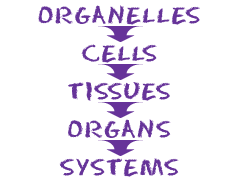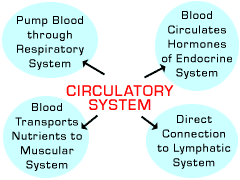
What is a System?
 A system is a group of organs that work together and provide an organism with an advantage for survival. It is the most complex organization in your body and the final level of the progression from cells to tissues to organs and then systems. Systems work alone and with other systems to allow your body to maintain homeostasis. Homeostasis is a stable internal environment that allows you (and your cells) to survive.
A system is a group of organs that work together and provide an organism with an advantage for survival. It is the most complex organization in your body and the final level of the progression from cells to tissues to organs and then systems. Systems work alone and with other systems to allow your body to maintain homeostasis. Homeostasis is a stable internal environment that allows you (and your cells) to survive.
While every one of your systems is needed to survive, your nervous system is the most important as you continue reading this page. Your eyes and brain are reading these words and remembering all of the information about systems. If you think about it, you are also using your muscular system to help move your eyes, pupils, and keep your head up.
Organs Working Together
Organs are a part of every system. Your heart is classified as an organ and it is a part of the circulatory system. Organs can work within several systems of your body. Many organs also have specific cells or tissues that have different functionality. Your kidneys are not only a part of your excretory system; they also have specific parts that serve the endocrine system.You, and many advanced mammals, have similar organs and systems. However, there is a wide variety of organ types found throughout the animal kingdom. Some aquatic animals have organs that remove salts from salt water and an animal like a cow might have multiple stomachs in the digestive system.
Systems Can't Work Alone
 We just explained how organs could be a part of several systems. Similarly, systems rarely work alone. All of the systems in an organism are interconnected. A simple example is the connection between the circulatory and respiratory systems. As blood circulates through your body, it eventually needs fresh oxygen (O2) from the air. When the blood reaches the lungs, part of the respiratory system, the blood is re-oxygenated. Your stomach, part of the digestive system, constantly interacts with your endocrine system and spreads hormones throughout your body.
We just explained how organs could be a part of several systems. Similarly, systems rarely work alone. All of the systems in an organism are interconnected. A simple example is the connection between the circulatory and respiratory systems. As blood circulates through your body, it eventually needs fresh oxygen (O2) from the air. When the blood reaches the lungs, part of the respiratory system, the blood is re-oxygenated. Your stomach, part of the digestive system, constantly interacts with your endocrine system and spreads hormones throughout your body.
Examples of Systems
It's easy to point out a few in your body. The two you think of the most are probably your respiratory and digestive system. A couple of times a day you might get hungry, sit down, and have a nice meal. All of that food gets broken down in your digestive system so that your body has energy to survive. The stuff your body doesn't need is pooped out at the other end.Since you're breathing all of the time, the respiratory system is always at work. You breathe in and out from your nose and mouth while your lungs are the main organs that allow your body to absorb the oxygen you need from the air. There are many other systems in your body and specialized systems in other animals around the world.
► NEXT PAGE ON ANIMAL SYSTEMS
► NEXT STOP ON SITE TOUR
► RETURN TO TOP OF PAGE
► Or search the sites...
► NEXT STOP ON SITE TOUR
► RETURN TO TOP OF PAGE
► Or search the sites...
Related Video...
Cells, Tissues, Organs and Nerves (NASA SciFiles Video)
Encyclopedia.com (Physiology):
http://www.encyclopedia.com/topic/physiology.aspx
Wikipedia:
http://en.wikipedia.org/wiki/List_of_systems_of_the_human_body
Encyclopædia Britannica:
http://www.britannica.com/EBchecked/topic/458848/physiology



